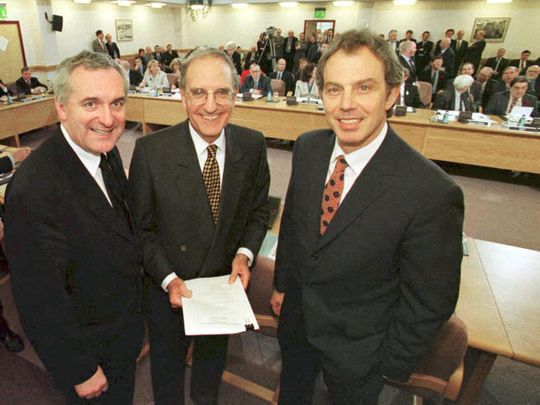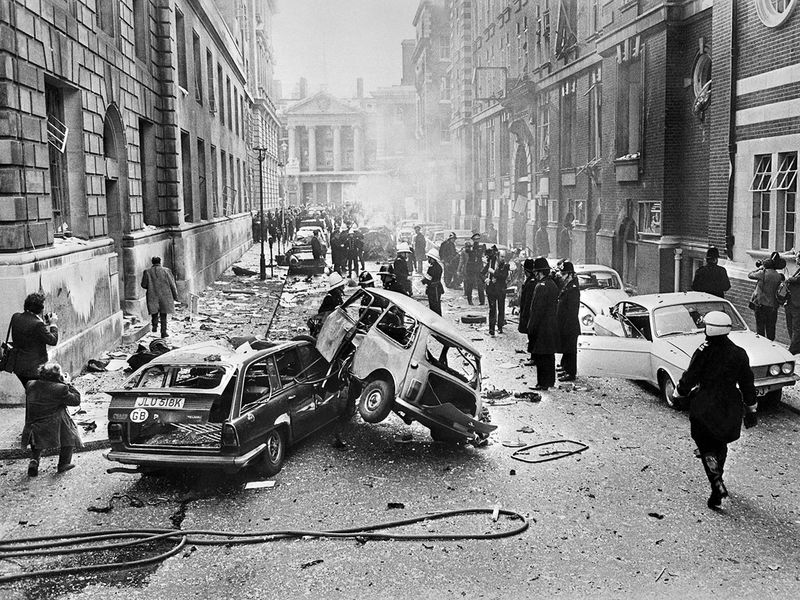
Twenty-five years ago, British Prime Minister Tony Blair and Irish Taoiseach Bertie Ahern signed the Good Friday Agreement, achieving peace in Northern Ireland after three decades of sectarian violence known as the Troubles claimed more than 3,500 lives.
The April 10, 1998, agreement, approved by 71 per cent of voters in the North and 94 per cent in the Irish Republic, was the result of years of painstaking negotiation between parties who had long seen each other as bitter enemies, a consequence of bombings, reprisals, discrimination in work and social life, constant anxiety and fear — all leaving a dark cloud hanging over their children’s collective future.
For the first time, the largely Protestant unionist parties and the primarily Catholic nationalist parties now would renounce violence, share power and determine their future together.
A generation on, the situation in Northern Ireland is far from perfect. Too little progress has been made in true integration between the two communities.
Peace has endured
Divided neighbourhoods remain, and economic inequality persists. The uncertainty surrounding Brexit — which Northern Ireland voted against — has led to political paralysis and left the country without a standing government for more than a year.
But against the odds, the peace has held and democracy has not lost its grip. The Windsor Framework, agreed on earlier this year by Britain and the European Union, offers the opportunity to maintain a growing Northern Ireland economy. And it embraces the Good Friday Agreement’s promise that peace would be strengthened by special relations between Northern Ireland and the Irish Republic while the North retains its place in the United Kingdom.
Why has peace in Northern Ireland endured, when other efforts around the world remain stubbornly far from a resolution? I believe the answer lies in the way the peace was made.
First, the process was driven by the people. They’d grown weary of the killing and the arbitrary tragedies of nonlethal political violence, and weary of the economic deprivation born of the divisions.
It was clear in the faces of the people I met on my visits there, of all backgrounds, that they were determined that the conflict must end. As Hillary has emphasised, the people, especially the women, were out in front of the politicians because they wanted their children and grandchildren to grow up outside the shadow of violence and hatred.

The Good Friday Agreement negotiations were driven and maintained through the rough spots by the demand for peace. It has produced an entire generation in Northern Ireland that has grown up largely free from the horrors of sectarian violence, free to focus on solving problems and seizing opportunities.
Second, the political leaders on all sides showed real courage in making sacrifices and compromises with their adversaries and committing to inclusivity, knowing perfectly well that they were putting their own political futures at risk. Trust was built slowly but surely through years of confidence-building measures, such as prisoner releases and ceasefires.
Real credit belongs to the leaders including Bertie Ahern and Tony Blair; before them John Major, Albert Reynolds and John Bruton; and to John Hume, David Trimble, Gerry Adams and many others. Third, the peace process was successful because the United States was deeply involved in a way that both sides came to see as positive.
America's role in Northern Ireland peace process
I believed America could and should play a role in the Northern Ireland peace process — not in spite of, but because of our “special relationship” with the United Kingdom, and because of the large Irish American community that cared deeply about their ancestral homeland.
Finally, the peace has held because the framework of the Good Friday Agreement has proved to be fair to all sides and better than any other deal that’s out there.
The details, hammered out under the brilliant, patient but determined watch of special envoy George Mitchell, reflected the complex views of both communities, enabling them to trust the agreement to protect their myriad interests.
The agreement committed the parties to majority rule with minority rights, respect for individual rights, civil rights and the rule of law, the prohibition of violence, and disarmament and demobilisation of paramilitary groups.
It also created a system of shared decision-making, shared economic benefits and special ties to the Republic of Ireland and the United Kingdom.
Though power-sharing has at times yielded frustration and even gridlock, it has given each side the opportunity to make its concerns heard and work toward consensus. Even now, with Stormont, the legislature, sitting unused, the question is “when” not “if” the government will get back up and running. Even the most imperfect democracy is better than a return to violence.
In 1995, when I made my first visit to Northern Ireland, I stood before a crowd of thousands in Derry and recited the lines of one of its favourite sons, Seamus Heaney:
“History says, Don’t hope / On this side of the grave. / But then, once in a lifetime / The longed-for tidal wave / Of justice can rise up, / And hope and history rhyme.”
The events that led to peace in Northern Ireland were a happy occasion of hope and history rhyming, but such achievements are still too rare. All around the world in areas of conflict and deep political and social divisions, people are yearning for better, safer, more inclusive days ahead.
The challenge will be finding the leaders with the courage to meet the moment and make the hard choices necessary for peace within frameworks that give everyone a voice.
On this anniversary, the people of Northern Ireland and all their friends around the world have much to celebrate. I hope this moment of shared memory will allow them to continue the work of peace and inspire others to believe, as Heaney wrote, in “miracles / And cures and healing wells” and find their own way forward.
Washington Post
Bill Clinton served as the 42nd president of the United States.








